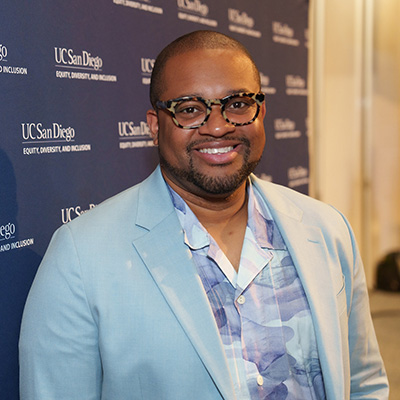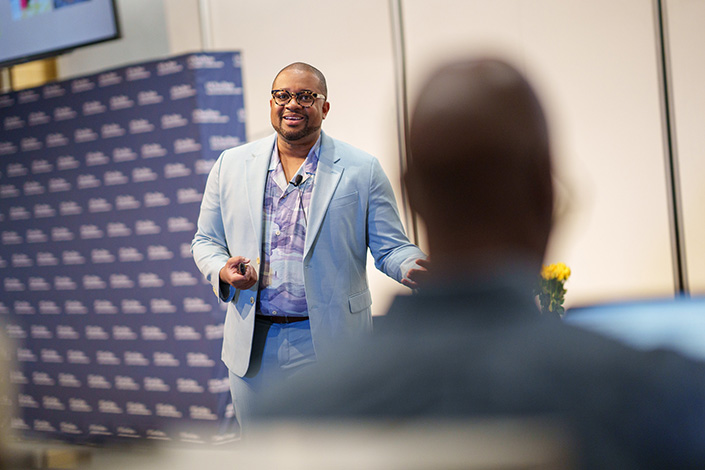Building a Culture of Care
Highlighting a collective impact approach, Equity in Mental Health series event centers on the experiences of Black male college students
Story by:
Published Date
Story by:
Topics covered:
Share This:
Article Content
What are the unique issues and challenges faced by Black male college students, and how do these impact their mental health? Which barriers often impede access to counseling or mental health services, and how can those barriers be removed? How can higher education practitioners promote communities of care on campuses—ones that will drive more equitable mental health outcomes?
Through the lens of his own lived experiences as a Black, queer and neurodivergent man, coupled with the findings of his own work—which critically examines queer and trans student inclusion at historically Black colleges and universities (HBCUs)—Jarrel T. Johnson, Ph.D., visited UC San Diego May 30 to discuss the answers to these questions and more. Johnson is an assistant professor of higher education in the Department of Education Leadership and Policy at the University of Utah.

His engaging presentation, entitled “Building a Culture of Care: A Collective Impact Approach for Holistically Supporting Black College Men’s Mental Health,” marked the latest in the university’s Equity in Mental Health quarterly series, funded by the University of California Office of the President and hosted by the Office of the Vice Chancellor for Equity, Diversity, and Inclusion (EDI).

“Through this event, we embrace the transformative power of collective impact,” said Becky R. Petitt, vice chancellor for Equity, Diversity, and Inclusion at UC San Diego. “By emphasizing holistic support for Black college men's mental health, we acknowledge their unique challenges and affirm our commitment to their success.”
During the spring quarter event, attendees—primarily staff members from departments ranging from athletics and student affairs to enrollment and beyond—gathered in the Liebow Auditorium at UC San Diego School of Medicine, where they enjoyed a complimentary lunch and were given free copies of the book “The Invisible Ache: Black Men Identifying Their Pain and Reclaiming Their Power” by Courtney B. Vance & Robin L. Smith.

During the discussion, which was moderated by John W. Rawlins III, a campus diversity officer and director of the UC San Diego Black Resource Center, Johnson vulnerably shared his own lifelong struggles with depression and anxiety and explained how the intersection of his identities and culture—growing up in a religious community in the South—often impeded his ability to access clinical mental health resources and psychological services.
“I want to create space today to talk about the things that we could be doing to support, bolster and enhance the strategies that Black men inhabit to manage and take care of their mental health,” Johnson said at the beginning of his presentation.” I don’t want to frame this as a group of folks who don’t have agency—but that they do—and that if we partner with them, we can do the work.”
Emphasizing that mental health is interconnected with other parts of an individual’s identity, such as financial well-being and overall physical health, Johnson expressed the challenges of growing up in a community in which he often heard the refrain, “It doesn’t matter how you feel, it matters how much you produce.”
“There is not a lot of space for Black men to feel safe, to feel vulnerable, like they can have moments of self-care,” Johnson said.
During his talk, he addressed society’s prevalent and problematic tendency to paint Black men as a monolith, and took participants through a discussion of the intersectionality of race, ethnicity, class, religion, citizenship, socioeconomic status, sexual orientation, gender identity and more—underscoring the importance of viewing and treating each student as an individual. However, Johnson did acknowledge and address specific barriers that Black students commonly face in higher education settings, sharing that Black male students are more likely to confront psychological stressors than any other racial or gender group, but less likely than their peers to seek out mental health resources.
“In general, Black college students wrestle with issues of racism, discrimination, financial limitations, academic challenges—which all pose direct threats to their overall mental health,” said Johnson. “Research has demonstrated consistently that there are challenges that Black men navigate while in college that oftentimes impede on their mental health.”
By implementing a collective impact approach on campuses—one that cultivates the collaboration of multiple actors in addressing a common agenda—Johnson believes that colleges and universities can remove barriers to mental health resources and create spaces where all community members can thrive.
On this front, Johnson shared strategies he’s implemented in his classroom, from opening class with mindfulness moments where students listen to a song and reflect on it together, to establishing “communities of care”—small groups of classmates who check in with and take care of one another.
“Students have now started to say, ‘I appreciate the wellness component to your courses,’” Johnson said. “Oftentimes we just ask folks to read, come to this program, do this or that. Everything is transactional. I stopped asking students, ‘Are you feeling OK?’ and now I ask them, ‘How are you feeling?’ That’s a different type of question.
"In general, Black college students wrestle with issues of racism, discrimination, financial limitations, academic challenges—which all pose direct threats to their overall mental health."

After encouraging attendees to think about the ways they show up for students in regard to mental health, Johnson closed his presentation with a challenge to take constant action and encourage continuous communication, rather than providing what he refers to as “one-off” opportunities to encourage mental health practices. He then opened the floor for questions from attendees, which ranged from how to elicit student engagement in events to how to help students let go of expectations of performance and production.
Later that evening, in a more intimate setting, campus community members gathered in the Comunidad Room in the Cross-Cultural Center for a second event, “Love Yourz: The Black Men’s Mental Health Mixtape,” which centered around the experiences of Black men at UC San Diego.
These events closed out the inaugural academic year for the Equity in Mental Health series, which kicked off in August with an opening event that boosted awareness of the mental health and wellness resources available at UC San Diego. In November, educators across campus were invited to participate in workshops led by neuroscientist Mays Imad, who discussed burnout on college campuses and how to transform classrooms into “resilient spaces.” Then, in March, a winter quarter event explored concepts of wellness and rest from an intersectional and social justice perspective.
Open to all members of the campus community and geared toward university employees, the series aims to promote trauma-informed practices, identify and incorporate self-care strategies and more. During each event, attendees were given “Equity in Mental Health Ambassador” buttons to wear, highlighting the shared effort to bring what they learn from the series back to their departments or communities, where they can share resources and spark discussions around prioritizing mental health.
You May Also Like
Engineers Take a Closer Look at How a Plant Virus Primes the Immune System to Fight Cancer
Technology & EngineeringStay in the Know
Keep up with all the latest from UC San Diego. Subscribe to the newsletter today.




